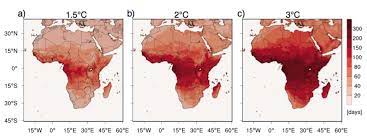agriculture and climate change
IRA Implementation: The State of Play
It’s not easy to get a handle on IRA implementation, but some agencies are off to a good start.
The Inflation Reduction Act is Biden’s signature climate program. You’d think it would be easy to get an analysis of the government’s funding efforts in its first year. It’s not. This seems like an unforced error to me. In political terms, this seems like a lost opportunity to showcase the government’s achievements; it’s also a …
Continue reading “IRA Implementation: The State of Play”
CONTINUE READINGAfrica in 2050
The continent will face vast challenges. Dealing with them is a global priority.
Take explosive population growth, acute vulnerability to future climate change, and social vulnerability. Stir well and bake. That’s a recipe for trouble. It’s also Africa in 2050. Overcoming the resulting problems is among humanity’s greatest challenges. Currently, 490 million Africans live below the extreme poverty level ($2/day per person). The number is rising but the …
Continue reading “Africa in 2050”
CONTINUE READINGTackling Agricultural Methane: Monitoring and Policy Strategies
A review of inventory, monitoring, and regulatory tools needed to reduce agricultural methane emissions
(This post was authored by Eric Peshkin, a JD candidate at NYU School of Law and CLEE summer research assistant) Last week, global leaders announced a commitment to reducing global methane emissions. In a previous blog post, I briefly reviewed some of the innovative strategies to reduce methane emissions from agricultural livestock and rice operations, …
Continue reading “Tackling Agricultural Methane: Monitoring and Policy Strategies”
CONTINUE READINGWhere’s the Beef?
Mississippi’s “Veggie Burgers” Ban is Almost Certainly Unconstitutional
Mississippi recently passed a law that has the effect of banning terms like “veggie burger.” It’s easy to imagine other states passing similar laws. From an environmental view, that’s problematic, because beef in particular is connected with much higher greenhouse gas emissions than plant products. It’s not just the methane from cow-burps, it’s also all …
Continue reading “Where’s the Beef?”
CONTINUE READINGGuest Blogger Ken Alex: Working and Natural Lands, From Sources to Sinks
Post #6 in a Series on California Climate Policy by Ken Alex, Senior Policy Advisor to Gov. Jerry Brown
[This is the sixth post in a series expressing my view of why California’s actions on climate change are so important and how they will change the world. The introductory post provides an overview and some general context.] Roughly 80% of California land is protected or agricultural. That includes deserts, forests, wetlands, foothills, and multiple vegetative types, …
Continue reading “Guest Blogger Ken Alex: Working and Natural Lands, From Sources to Sinks”
CONTINUE READING






